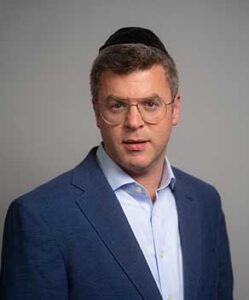
When the owners of one of the last nonprofit nursing homes in Philadelphia announced last month that they were selling, the news could hardly have come as a surprise.
The Felician Sisters of North America had operated the 176-bed St. Ignatius Nursing & Rehab Center at a loss for five years and its occupancy was at a paltry 56%.
Those details made it an attractive potential pick-up for Allaire Health Services.
The New Jersey-based for-profit nursing home chain has charted a steady upward trajectory since CEO Ben Kurland bought his first facility in 2016. Allaire has grown to 17 facilities in four states, much of that expansion coming since the beginning of the pandemic, and nearly all of it through the acquisition of nonprofit or publicly owned nursing homes.
Along the way, the turnaround buyer and speciality provider has built a reputation as a for-profit entity that nonprofits and government agencies want to work with. One of the keys is not dictating a specific model for a new facility, but rather conducting a comprehensive review that allows Allaire to craft a route to recovery. Often, that starts with a management partnership that gets off the ground while sale details are being negotiated.

“That’s been a lot of our success both after the transaction and during the transaction,” Kurland told McKnight’s Long-Term Care News. “We do a lot of nonprofit work. A lot of times, they need a little hand-holding through the process, and being nimble as a company is something we’ve always been and really want to be.”
Building by building
Kurland has always moved one purchase at a time and remains sole owner of most of his facilities, according to Care Compare listings. He said his management team’s first step in any building it considers buying is to assess location, patient type and health needs found in the surrounding community so that it can build a patient profile to inform planned improvements.
And where others might turn away from a low-occupancy nursing home with millions in debt — or from buildings with such poor patient outcomes that they’re on or candidates for the Special Focus Facility program — Kurland often sees opportunity.
“One of the things we look at is historical census. Is it strong? If the answer is yes, a lot of times it may be about adding our level of expertise to figure out how to manage it appropriately,” said Kurland, a former administrator who co-owned three Aristacare buildings before launching Allaire.
“It’s never great taking over a building that’s losing money, but in this case [in Philadelphia], we run buildings in that same market, that same area,” he added. “We know what our expenses are going to be. We know more or less how to project revenue, and we just adjust that to the building specifics. That’s where we get a comfort zone and obviously, our lenders do as well.”
Expanding through networks
Allaire’s model relies largely on footprint and expansion is being guided by existing relationships, Kurland said.
Deep health system and insurer ties in a given state can help when building fresh referral networks for struggling nursing homes. But relationships also have helped smooth the way for additional deals, as was the case with the company’s $4.2 million purchase of the Centers for Living and Rehabilitation in Bennington, VT, back in 2021.
While it was outside Allaire core operations in New Jersey and Pennsylvania, another nonprofit suggested the sellers and town officials who had to sign off on any deal consider Allaire. In the Vermont deal, Southwestern Vermont Health Care reportedly maintained a small ownership stake in the nursing home.
In Pennsylvania, state officials also tapped Allaire to help run Special Focus Facility Brighton Rehabilitation and Wellness Center when it was overrun with COVID. The company’s ability to cultivate relationships with local and state governments and nonprofits under pressure runs counter to the way some have characterized for-profit providers of late.
Undeserved bad rap
That public rhetoric is grossly unfair, especially after some of the unintentional mismanagement Kurland has seen at nonprofits operations he’s acquired, he said.
“You have mostly good actors in this space — people do want to do good,” Kurland said. “They care about patient care. We just need the tools to succeed. We need the resources to succeed, and we need common sense to be there.”
While Allaire does operate 4- and 5-star nursing homes, its Care Compare average sits far lower at 2. (The ownership information for Allaire also appears to be outdated, reflecting a total of just 11 properties). Kurland said ratings don’t tell the whole story.
“We’ve taken over a couple of Special Focus buildings and some Special Focus candidate buildings. That’s something that we’re not afraid to do,” he said. “We have more than enough resources within our teams to really deal with that. Obviously, there’s a level of risk that’s involved, but we don’t shy away.”
Take, for example, Allaire’s building in East Orange, NJ. Kurland took over the 185-bed Grove Park Healthcare & Rehabilitation Center in early 2021 as 99% owner. It had been in the Special Focus program for 13 months when acquired and the Centers for Medicare & Medicaid Services had tagged it as failing to show improvement.
The building has now improved enough to get off the Special Focus list and each floor and the building’s exterior has been renovated. While it still holds a 1-star overall rating, the facility has had no complaint inspections in more than a year and just one infection control citation in the last three years.
Its specialty services include onsite vascular care and behavioral health services, including twice-weekly rounding by an addiction counselor to work with patients with substance abuse issues.
Taking a ‘Special’ approach
Allaire is managing a Special Focus Facility for another owner in New Jersey, where Allaire has “put a game plan in place to make sure that it moves off.” The company also already has an option to buy the facility.
Despite the headwinds, Kurland remains optimistic for his company’s future prospects.
“There’s never been a tougher time that I recall in the long-term care industry. You have staffing, which is a major, major issue. You have interest rates that so many buildings are dependent on. Interest rates keep going up and that creates cash flow issues for some buildings. And you still have occupancy issues, although I’ve seen that easing,” he said.
“But with the tough times comes opportunity for the good operators because ultimately, any time there is disturbance or disruption in an industry, that creates opportunity,” he added. “Wherever you are, on the state level , the federal level, everyone is smart enough to realize that nursing home and healthcare at large are not a luxury, it’s a necessity and when they see it through that lens, they say, OK, let’s see how we can try to make things better. That’s what we want to do.”




